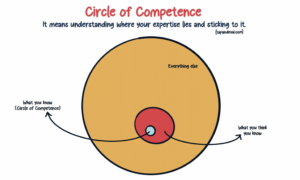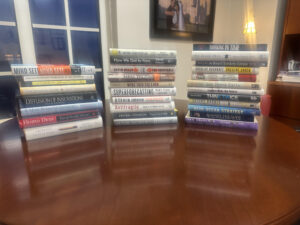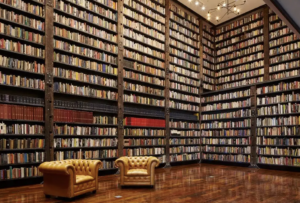
Thought Leadership: To the right is a partial list of the books I’ve used to put together my course on “Foresight: Why Thinking About the  World of Tomorrow is Today’s Most Important Skill”–which I am teaching this Spring semester at the College of St. Benedict’s and St. John’s University. I do not show it to impress you with my knowledge. Instead, I direct you to the photo below. This photo is meant to depict my idea of an “anti-library.” An anti-library serves as a physical reminder of the many books I still have not yet read, and its purpose is to remind me of how much I still have to learn. This may sound counterintuitive but, as a futurist, one of my strengths is that I strive to be more aware of what I don’t know than my clients. The reason is straightforward: It is in the vast space of “the unknown”–or what we don’t know–that the future is likely to take place. In this way, our ignorance can be an invaluable asset provided we remain cognizant of it. (For a visual
World of Tomorrow is Today’s Most Important Skill”–which I am teaching this Spring semester at the College of St. Benedict’s and St. John’s University. I do not show it to impress you with my knowledge. Instead, I direct you to the photo below. This photo is meant to depict my idea of an “anti-library.” An anti-library serves as a physical reminder of the many books I still have not yet read, and its purpose is to remind me of how much I still have to learn. This may sound counterintuitive but, as a futurist, one of my strengths is that I strive to be more aware of what I don’t know than my clients. The reason is straightforward: It is in the vast space of “the unknown”–or what we don’t know–that the future is likely to take place. In this way, our ignorance can be an invaluable asset provided we remain cognizant of it. (For a visual
reminder of this idea, please refer to “The Circle of Competence” photo above.”)

Think Strategically: The beauty of thinking about the future is that we can train ourselves to think better. To this end, I found this article, “The 6 Disciplines of Strategic Thinking,” to be a worthwhile read. If you don’t have time to read the whole piece, the six disciplines are 1) pattern recognition; 2) systems analysis; 3) mental agility; 4) structured problem-solving; 5) visioning; and 6) political savvy. I also found this post by Daniel Pink on 7 ways to improve your decision-making to be helpful.
Think in Questions: In a rapidly changing world where clear answers to the future are rarely available, it may be time to stop asking yourself this common question: Will this work? Instead, try replacing it with this question: Is it worth trying?
Think Deeper: Yuval Noah Harari, the author of Sapiens and Homo Deus, is one of today’s best thinkers. I found this interview with him on the topic of ‘How do we share the planet with AI’ to be incredibly provocative. It is loaded with powerful insights.
Thoughts from Beyond: As a Celtic Christian, I try to read the Bible daily, and I find it to be a source of comfort, inspiration, and wisdom. I do not, however, accept that every word or idea is Divinely inspired. This is because it was humans who decided which books and passages were to be included in the Bible. To this end, for years, I have read and heard the passage where Jesus says, “Seek and Ye shall find.” It sounds so simple, doesn’t it? Just “seek” and you will “find.” The Gospel of Thomas (which is not included in the Bible) has a different interpretation. Here is what Thomas says Jesus said: “If you are searching, you must not stop until you find. When you find, however, you will become troubled. Your confusion will give way to wonder. In wonder, you will reign over all things. Your sovereignty will be your rest.” I tell you this because if, like me, you are a seeker, your journey may not be as simple as “seeking and finding.” Instead, it may be filled with trouble and confusion. Still, I encourage you–whatever your faith–to keep working through the trouble and confusion, for I have faith it will end in wonder and sovereignty.
